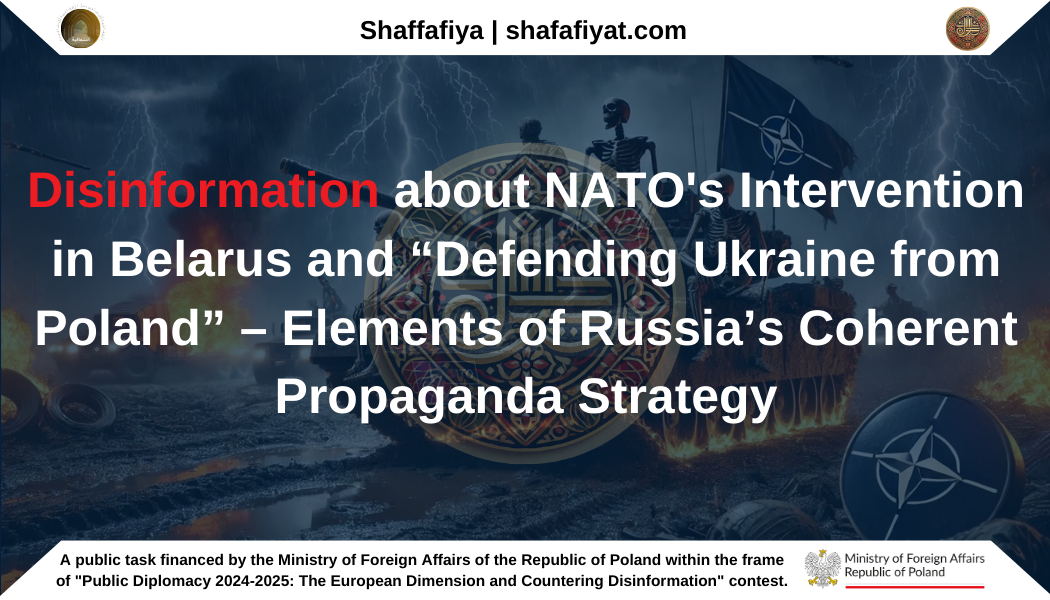
Disinformation about NATO’s Intervention in Belarus and “Defending Ukraine from Poland” – Elements of Russia’s Coherent Propaganda Strategy
In recent weeks, Russian informational propaganda has intensified efforts aimed at destabilizing relations between NATO, Poland, Ukraine, and neighboring countries. Two recent narratives—namely, the alleged NATO intervention plan in Belarus from the territories of Poland, Lithuania, and Ukraine, and the narrative about Russia and Belarus “defending Ukraine” from Polish aggression—constitute part of a broader disinformation strategy. Such messages are widely disseminated both in Europe and the MENA region, where Russia has for years effectively manipulated public opinion, portraying itself as a counterbalance to the West.
Narrative 1: NATO “Attacking Belarus”
The narrative about an alleged planned NATO intervention in southwestern Belarus has been spread by Russian state media such as RIA Novosti. According to these reports, Poland, Lithuania, and Ukraine, supported by NATO forces, are planning a military operation targeting Belarus. The false information contains key elements of typical Russian propaganda:
-
Presenting NATO as an aggressor destabilizing Eastern Europe.
-
Depicting Poland and Lithuania as imperialist countries using Ukraine to pursue their expansionist plans.
-
Mobilizing public opinion around the idea of a “besieged Russia and its allies,” allegedly defending their sovereignty.
This narrative aims to instill fear in the region and undermine international trust in NATO. A particular goal is to discredit Poland, which plays a crucial role in supporting Ukraine and strengthening NATO’s eastern flank.
Narrative 2: Russia and Belarus “Defending Ukraine from Poland”
Simultaneously, Russia promotes a contradictory narrative in which Poland is the aggressor against Ukraine, while Russia and Belarus act as defenders of Ukrainian sovereignty. As noted in an article on the Disinfo Digest portal (“Disinformation: Belarus and Russia Defend Ukraine from ‘Aggressive’ Poland”), this narrative seeks to:
-
Create tensions between Poland and Ukraine, which have been key allies since Russia’s aggression against Ukraine.
-
Undermine Polish support for Ukraine by fostering internal divisions and spreading false claims about “Polish imperialist plans.”
Russia deliberately manipulates messages to sow contradictions and chaos among allies while portraying itself as a defender of justice and stability.
Connections Between Narratives: Russia’s Disinformation Strategy
Both narratives—the alleged NATO aggression against Belarus and the “defense of Ukraine from Poland”—are elements of a coherent disinformation campaign aimed at achieving several key objectives:
-
Undermining NATO Unity and Alliance Relations
By simultaneously spreading contradictory narratives, Russia seeks to weaken cooperation among NATO allies, particularly on the eastern flank. Poland and Ukraine are key targets, as their relations are fundamental to supporting Ukraine’s defense against Russian aggression. -
Strengthening Anti-NATO Sentiments in the MENA Region
In both Europe and the MENA region, Russia portrays NATO as aggressive and imperialistic, resonating with anti-Western sentiments, especially in countries with colonial pasts. This propaganda builds Russia’s image as an alternative global power opposing Western “neocolonialism.” -
Creating Informational Chaos
The calculated use of contradictory messages aims to confuse audiences. On one hand, NATO is presented as an aggressor against Belarus, while on the other, Poland is portrayed as an aggressor against Ukraine. Such narratives undermine trust in international institutions and complicate the audience’s ability to assess the real situation. -
Positioning Russia as a Stabilizer and Defender
In both the alleged defense of Ukraine and repelling NATO in Belarus, Russia and Belarus are depicted as “forces of good” standing up for weaker states against the imperialist ambitions of the West.
Objective of Disinformation: Undermining International Relations and Mobilizing Support for Russia
The long-term goal of Russian propaganda is to weaken relations between NATO, Poland, and Ukraine, as well as to destabilize public opinion in regions such as MENA. These actions aim to:
-
Reduce support for Ukraine by spreading narratives about Poland’s “imperialist plans.”
-
Undermine NATO’s position as a guarantor of security in Eastern Europe.
-
Strengthen Russia’s international standing as an alternative force ensuring order and stability.
Conclusions and Recommendations
Russian propaganda, based on contradictory narratives about NATO and Poland, is part of a broader informational strategy aimed at destabilizing international relations and strengthening Russia’s position. In light of these actions, it is necessary to:
-
Increase public awareness in Europe and the MENA region about the disinformation mechanisms used by Russia.
-
Strengthen NATO cohesion by actively countering disinformation and building a unified message based on facts.
-
Promote transparent communication between Poland, Ukraine, and their international partners to counter attempts to weaken allied relations.
Disinformation remains one of the most significant tools of Russian foreign policy, and its effectiveness requires a determined and coordinated response from democratic countries. Mutual support, joint strategies, and raising public awareness are key elements in countering Russian informational manipulations.
A public task financed by the Ministry of Foreign Affairs of the Republic of Poland within the frame of “Public Diplomacy 2024-2025: The European Dimension and Countering Disinformation” contest
The publication expresses only the views of the author and cannot be identified with the official position of the Ministry of Foreign Affairs of the Republic of Poland.


